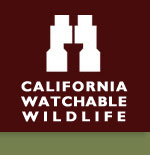

| Area: 7,400 Acres | ||
| Lat: | ||
| Lon: | ||
| Nearby Services | ||
| Site Facilities | ||
| Join Our Mailing List |
|
For Email Marketing you can trust
|
Top Banner Photo Credits
Pam Starr
Alyn Robert Brereton
Julie MacKinnon
Linda Pittman
Parham Pourahmad
Larry Whiting
Randall Finley
Pam Starr
Alyn Robert Brereton
Julie MacKinnon
Linda Pittman
Parham Pourahmad
Larry Whiting
Randall Finley
© 2008-2024 California Watchable Wildlife and Blue Cat Studio, Inc.
| Sinkyone Wilderness State Park - Site # 195 | |||
| Background: | This unspoiled Lost Coast park is known for its dense forests, steep gorges, rugged coastline, and maagnificent vistas. An arduous drive into the park ends at Needle Rock Visitor Center, with views of a 6-mile-long terrace often occupied by Roosevelt elk. The grasslands lead to steep cliffs flanked by tidepools and battered by surf. Pelagic cormorants and common murres nest in offshore rocks that are also popular haulouts for harbor seals and sea lions. The Coast Trail meanders for 20 miles, passing streams, redwood groves, and primitive camping spots. Patient observers may see mule deer, foxes, porcupines, even a black bear or mountain lion. Watch for California gray whales offshore. | ||
| The Habitat: | redwoods 5% spruce 60% Meadows 20% Rocky outcroppings and beaches 15% | ||
| The Experience: | One of the few official wilderness parks within the California State Park system. See big animals up close. | ||
| Wildlife and Where to Find It: | trails, overlooks | ||
| Viewing Tips: | FOR EXPERIENCED MOUNAIN DRIVERS; NO TRAILERS OR RVs. ACCESS ROAD IS DIRT, RUGGED, STEEP, AND WINDING; ONE-LANE FOR 6 MILES WITH FEW PULLOUTS. CARS OKAY IN SUMMER; FOUR-WHEEL-DRIVE VEHICLES ONLY IN WINTER. Roosevelt elk, harbor seals, shorebirds, marine birds can be seen year-round. Whale watching is ixcellent in winter and spring. Ospreys are common. Iris blooms in spring and summer. All viewing by trails. Hike-in camping only at established sites. | ||
| Site Notes: | Spectacular coast line. Rugged terrain. Redwoods. Spruce. Meadows. Elk. Find yourself on the 'Lost Coast'! | ||
| Viewing Site Hours of Operation are: | |||
| Staff On-site: | Yes | ||
| Open: | Everday | ||
| Hours: | |||
| Year Round: | Yes | ||
| Seasonal: | Road occasionally closed in winter due to flooding | ||
| Road Information: | |||
| Road Hazards: very steep and closed at points during the winter | |||
| Parking Fee: No | |||
| Proximity to viewing area: | |||
| Parking Notes: | |||
| How to Get There: | From Highway 101 near Garberville, follow signs to Redway and Shelter Cove. In Redway, turn west on Briceland Road. After about 14 miles, at Whitethorn/Shelter Cove junction, take road to Whitethorn. Pavement ends after you pass through Whitethorn. Continue ondirt road, straight through Four Corners intersection, to Needle Rock. About 1.5 hours from Redway. | ||
| Contact Information | |||
| Managing Agency: | California State Parks | ||
| Agency Site URL: | http://www.parks.ca.gov/default.asp?page_id=429 | ||
| Physical Address: | P.O. Box 245 Whitethorn, CA 95489 |
Agency 2: | PO BOX 2006 Eureka, CA 95502 |
| Manager Phone: | |||
| Site Phone: | (707) 247-3319 or (707) 986-7711 | ||
| County: | |||
| Addition Website: | |||
